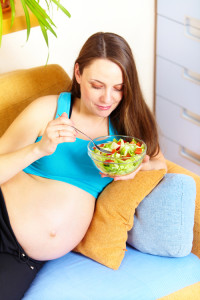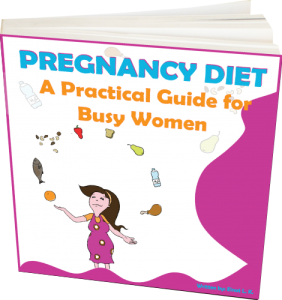 Being pregnant is one of the most exciting times in any woman’s life, but it’s not without its side effects. The first three months of pregnancy are a roller coaster ride for your body, which can lead to major food aversions and nausea – plus the dreaded morning sickness that affects up 75% of women. But eating healthy is one of the most important aspects of your pregnancy, for both you and your unborn child.
Being pregnant is one of the most exciting times in any woman’s life, but it’s not without its side effects. The first three months of pregnancy are a roller coaster ride for your body, which can lead to major food aversions and nausea – plus the dreaded morning sickness that affects up 75% of women. But eating healthy is one of the most important aspects of your pregnancy, for both you and your unborn child.
Why Eat Healthy?
While your baby is growing in the womb, they’re absorbing the vitamins and nutrients from what you eat. If you’re only eating junk food that’s low in nutritional value, you’re doing nothing to boost your child’s brain power or bone density. In fact, a poor diet can potentially lead to health issues like gestational diabetes or long-term developmental issues after your baby is born.
In addition, the actual tastes of what you’re munching on will pass through the placenta and into the amniotic fluid, which the baby is constantly swallowing and using to build up their taste buds. If you’re into planning ahead, it’s been strongly theorized that eating a range of fruits and veggies during pregnancy can not only help your baby’s mental and physical development, but also lead to more open-minded eating habits down the road. So if you want your little one to eat their peas and carrots five years from now, make sure you stock up on them while pregnant.
That’s not to say you can’t ever indulge in that slice of chocolate cake you’re so desperately craving. Just don’t think that being pregnant for nine months is carte blanche to snack on whatever you want. Take it easy on the sweets and salty foods – you’ll already be gaining a fair bit of weight as a normal part of your pregnancy, and sticking to a balanced, whole foods-based diet can ensure you aren’t packing on unnecessary pounds.
Now that you know the benefits of eating healthy, you might be wondering what to eat during pregnancy. Many women are fearful of eating the ‘wrong’ thing that might harm their unborn child, and rightfully so. What may be healthy for a fully grown adult can carry some risks for a developing fetus.
So where can you look for information on pregnancy nutrition?
Online
The internet provides a vast pool of information, with instant answers literally at your fingertips. If you’re unsure as to whether vegetarian sushi or decaffeinated tea is ‘safe’ to consume, or you’re wondering whether an avocado or an orange provides the best nutritional bang for your buck, a quick web search will likely turn up other women with the same questions as you. The challenge, of course, is the internet is completely unregulated. There’s no way to tell whether the information you find is actually accurate or written by a credible source.
Prenatal Nutrition Books
There are some questions that women ask themselves over and over again – Is it safe to eat tuna during pregnancy? How many extra calories should I be eating per day? – so much so, that many books have been specifically written on the subject of pregnancy nutrition. Although you’ve likely heard the rumors about what is and isn’t great to eat while pregnant, an up-to-date book by a qualified medical professional or nutritionist can be a handy go-to resource guide throughout your pregnancy. Whenever you’ve got a question, simply pull out your book and you’ll likely find some genuine, verified answers, along with tips you may not have thought of.
Dieticians / Medical Professionals
At the start of your pregnancy, you may want to ask your doctor for a referral to a special dietician to review your prenatal dietary needs, especially if you’ve got special concerns like a vegetarian or gluten-free diet. Alternatively, you can also ask your doctor nutrition questions during your prenatal visits. Unfortunately the need to schedule an appointment with a medical professional is a roadblock to receiving those instant answers you may be looking for, so consider jotting down nutritional concerns as they come up and coming prepared to have an in-depth conversation about your diet when you have the opportunity to do so.
Pregnancy Must-Do
The earlier you grasp the basics of pregnancy nutrition, the easier it will be to make the right, safe choices. Get started on analyzing and potentially rebooting your eating habits this week with the following three steps:
- First, make a list of your favorite foods that you believe to have some nutritional content. Remember, we’re not just talking about what you love to eat the most – if chips or ice cream are tops, skip them for this exercise. If you’re having food aversions thanks to your pregnancy, your ‘favorite’ foods might very well be the foods you’re actually able to get down and keep down.
- Using the suggested research method of your choice (online, books, or medical professionals), learn what your favorite foods provide in terms of key vitamins and nutrients. If you spot any gaps – for example, you see you aren’t getting enough potassium – consider taking a multi-vitamin or researching what foods are high in the missing nutrients.
- Once you’ve got your favorite, nutrient-rich foods picked out, look for recipes or cookbooks that feature those ingredients prominently. Make a pledge to eat at least one of those recipes, every week of your pregnancy. Who knows, by the end of your pregnancy you may have uncovered some new, healthy, go-to recipes!
P.S.
Looking for a good place to start reading up on healthy eating habits for you and baby?
Try “Pregnancy Diet: A Practical Guide for Busy Women“ for simple and easy tactics to prepare nourishing meals during your pregnancy.

The wonderful book Pregnancy Diet: A Practical Guide for Busy Women
